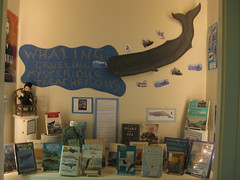One hundred and sixty years since the publication of Herman Melville’s Moby-Dick, and our fascination with all things whaling endures. Books and articles continue to be published, new discoveries made, and Moby Dick is secure in his spot on the AP English Literature reading list. What makes whaling all the more fascinating for us here in Byfield is our proximity to the origins of many great whaling vessels. The whaleship Essex was built just up the road in Amesbury. The Essex was captained by George Pollard Jr., of Nantucket. This was the whaleship that went down with more than half of its crew after being attacked by a whale. And therein lies the tale of Moby Dick. We have a number of excellent non-fiction reads on the sinking of the whaleship Essex. It’s intriguing to contemplate the extent to which the anthropomorphisation of the whale played a role in drawing men to the sea in this harshest of jobs. Archaeologists announced just last month that they have discovered the remains of another 1800’s whaler just north of Hawaii, the Two Brothers, which may very well have also been made in Amesbury, and was also captained by Mr. Pollard.

No comments:
Post a Comment